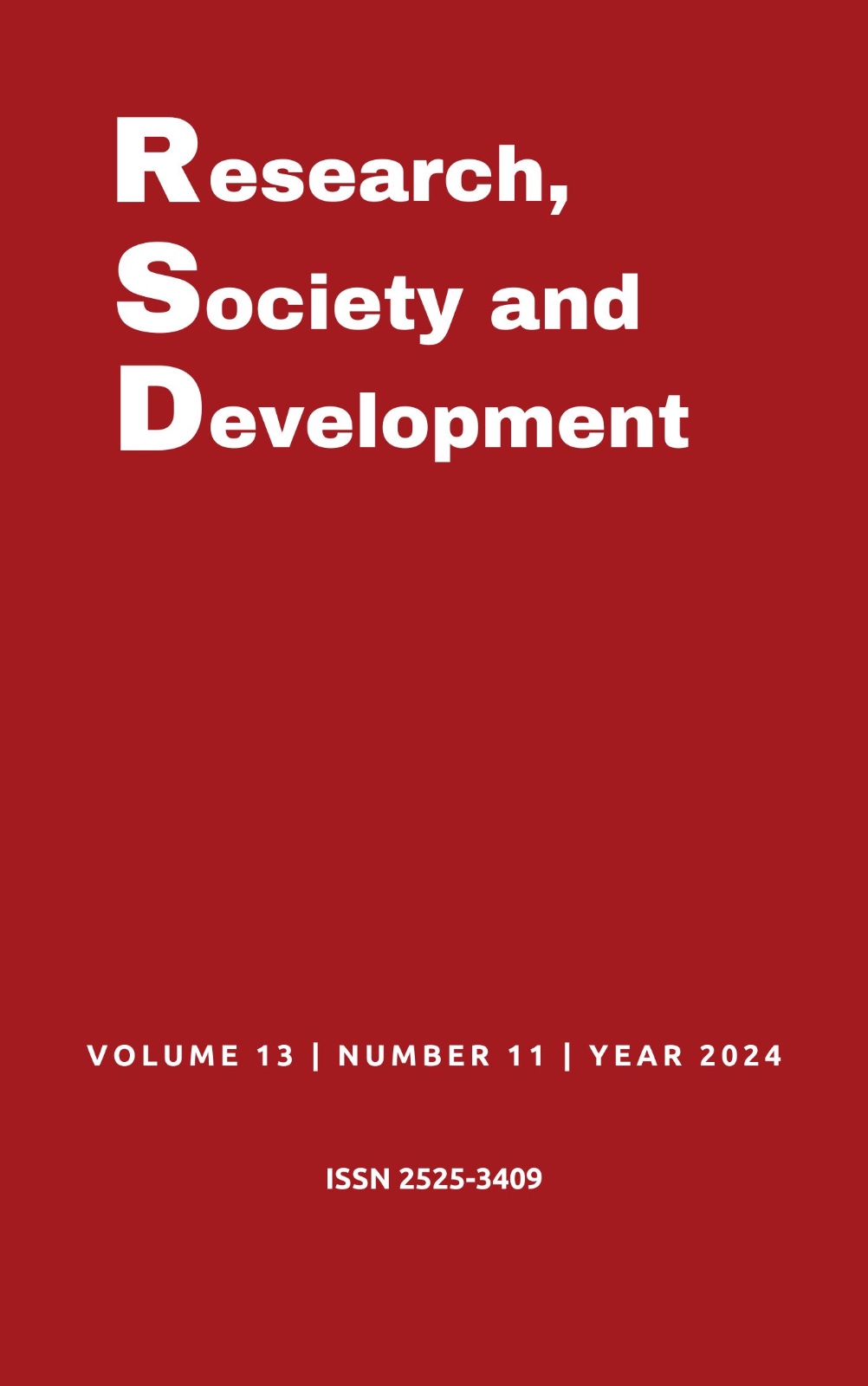The role of games and pranks as a pedagogical tool in the literacy process of students in the first stage of Elementary School 1
DOI:
https://doi.org/10.33448/rsd-v13i11.47340Keywords:
Games and Pranks; Playful Learning; Literacy; Teaching; Social Interaction.Abstract
The objective of this study was to analyze the importance of games and balices as a pedagogical tool in the literacy process of students in the first stage of Elementary School I. A literature review was carried out, with a qualitative approach where articles published from 2017 to 2024 were selected. Try to understand how playful and interactive activities can contribute to the learning process, creating a more motivating and engaging environment for students in this age group. Games, by promoting interactivity and fun, facilitate understanding of the content of the school curriculum, as well as students' interest in carrying out diverse activities through playing. The child's literacy process is continuous, carrying out the stages of knowledge. The results revealed that the inclusion of these practices in the school routine not only favored the concepts of sounds and letters, but also contributed to the construction of integral concepts of the child, making learning more active, dynamic and meaningful.
References
Alves, R. (1987). A gestação do futuro. Acampamento.
Antunes, C. (2003) Jogos para a estimulação das múltiplas inteligências. Vozes.
Brito, J. A. A., Nascimento, L. C. S., & Azevedo, G. X. (2022). Ludicidade na alfabetização: mais que jogos e brincadeiras. REEDUC - Revista de Estudos em Educação, 8(1), 530-555. https://doi.org/10.31668/reeduc-ueg.v8i1.12729
Castro, T. R., Oliveira, A. R., & Costa, M. C. M. (2023). Alfabetização na educação física por meio de jogos e brincadeiras. Revista Educação Física em Foco, 1(4), 1-15.
Costa, A. M. F., & Leite, A. C. X. (2022). Jogos e brincadeiras na alfabetização de crianças dos anos iniciais do ensino fundamental. Faculdade Sant'Ana em Revista, 6(2), 242-252. https://doi.org/10.18616/rsp.v5i2.6809
Ferreiro, E., Teberosky, A. (1999) Psicogênese da língua escrita. Artmed.
Freire, P. (1967) Educação como Prática da Liberdade. Paz e Terra.
Freire, P. (1989) A importância do ato de ler: Em três dimensões do processo de ler. 28. São Paulo.
Crossetti, M. G. O. (2012). Revisão integrativa de pesquisa na enfermagem: o rigor científico que lhe é exigido. Revista Gaúcha de Enfermagem, 33(2), 8-13. https://doi.org/10.1590/S1983-14472012000200001
Gallahue, D. L. & Ozmun, J. C. (2005). Compreendendo o Desenvolvimento Motor: Bebês, Crianças, adolescentes e adultos. (3. ed.). Phorte Editora.
Gontijo, C. M. M., & Mortatti, M. (2020). Jogos como recursos didáticos na alfabetização: O que dizem e fazem as professoras. Educação em Revista, 36, 1-16. https://doi.org/10.1590/0102-4698220532
Gemaque, M. (2023). A interação a partir do lúdico no processo de alfabetização e letramento no 1º ano do ensino fundamental. Revista Educação e Pedagogia, 1(4)
Martins, P. P. H., & Galvão, I. B. M. (2022). A importância do lúdico no processo de aprendizagem na educação infantil. Revista Científica, 8(1), 1-12. https://doi.org/10.32749/nucleodoconhecimento.com.br/educacao/ensino-aprendizagem
Mattos, P. (2015). Transtorno de déficit de atenção e hiperatividade (TDAH) na prática clínica. Jornal Brasileiro de Psiquiatria, 56(Supl. 1). https://doi.org/10.1590/S0047-20852007000500001
Monteiro, S. H. (2018). A importância dos recursos materiais na prática da Educação Física Escolar. Revista Educação Física e esporte, 25(2), 45-57.
Oliveira, N. D. C., & Damasceno, E. C. G. (2020). Jogos e brincadeiras como recursos facilitadores da aprendizagem na Educação Infantil da Escola Bom Jesus da Lapa no Distrito de Gergelim, Araripina- PE. Id on Line Revista Multidisciplinar e de Psicologia, 11(36), 407-434. https://doi.org/10.14295/idonline.v11i36.801
Santos, M., Faria, A. S., Silva, E. R., & Milagre, M. E. P. (2024). O uso de jogos e brincadeiras no processo de alfabetização e letramento na educação infantil. Perspectivas em Diálogo: Revista de Educação e Sociedade, 11(26). https://doi.org/10.55028/pdres.v11i26.19212
Scheffer, A. S., & Volpato, G. (2021). Os jogos e as brincadeiras no processo de alfabetização: Um estudo sobre a percepção de professoras dos anos iniciais. Revista Saberes Pedagógicos, 5(2), 1-10. https://doi.org/10.18616/rsp.v5i2.6809
Silva, F. S., Silva, C. S., Alencar, D. S. & Amorim, M. R. (2019). As contribuições dos jogos e brincadeiras no processo de ensino-aprendizagem. Revista Brasileira de Desenvolvimento, 5(4), 3820-3833 https://doi.org//10.34117/bjdv5n5 -1553
Soares, M. (2013) Alfabetização e letramento. (6.ed. 5° reimp). Contexto.
Vygotsky, L. S. (1978). O Papel do Brincar no Desenvolvimento Social da Criança. O Desenvolvimento dos Processos Psicológicos Superiores. Combrioge Ma: Harvard University Press.
Downloads
Published
How to Cite
Issue
Section
License
Copyright (c) 2024 Luana dos Santos Guimarães; Cristielton Uchôa Santarém; Luciano Alexandre Rodrigues dos Santos ; Alessandra Bárbara César de Freitas Boaventura; Joaquim Albuquerque Viana; Estela Aita Monego

This work is licensed under a Creative Commons Attribution 4.0 International License.
Authors who publish with this journal agree to the following terms:
1) Authors retain copyright and grant the journal right of first publication with the work simultaneously licensed under a Creative Commons Attribution License that allows others to share the work with an acknowledgement of the work's authorship and initial publication in this journal.
2) Authors are able to enter into separate, additional contractual arrangements for the non-exclusive distribution of the journal's published version of the work (e.g., post it to an institutional repository or publish it in a book), with an acknowledgement of its initial publication in this journal.
3) Authors are permitted and encouraged to post their work online (e.g., in institutional repositories or on their website) prior to and during the submission process, as it can lead to productive exchanges, as well as earlier and greater citation of published work.

